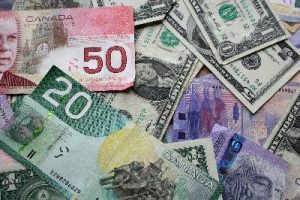 Yesterday’s trade saw USD/CAD within the range of 1.3513-1.3736. The pair closed at 1.3544, plummeting 1.15% on a daily basis. It has been the 17th drop in the past 38 trading days and also the steepest one since February 17th, when the pair depreciated 1.39%. In addition, the daily low has been an exact test of the low from December 9th 2015.
Yesterday’s trade saw USD/CAD within the range of 1.3513-1.3736. The pair closed at 1.3544, plummeting 1.15% on a daily basis. It has been the 17th drop in the past 38 trading days and also the steepest one since February 17th, when the pair depreciated 1.39%. In addition, the daily low has been an exact test of the low from December 9th 2015.
At 8:03 GMT today USD/CAD was edging down 0.11% for the day to trade at 1.3529. The pair touched a daily low at 1.3525 during mid-Asian trade, undershooting the daily S1 level, and a daily high at 1.3550 during the early phase of the Asian trading session.
Canada’s dollar advanced to highs unseen in 2.5 months against its US counterpart, as crude oil futures recorded a 2.92% surge on Thursday. February 25th marked the 25th gain in oil prices out of the past 50 trading days. Oil futures for April delivery went up as high as $33.49 per barrel on February 25th, or the highest level since February 23rd, and closed at $33.09. As of 7:43 GMT today the commodity was gaining 0.88% on a daily basis to trade at $33.38 per barrel, after going up as high as $33.41 earlier. Oil has trimmed its slump to 0.95% so far during the current month.
On Friday USD/CAD trading may be influenced by the following macroeconomic reports as listed below.
Fundamentals
United States
Gross Domestic Product – second estimate
The second estimate of the US Gross Domestic Product probably pointed to an annualized rate of growth of 0.4% in the final quarter of 2015, according to the median forecast by analysts. The preliminary GDP estimate for Q4, reported on January 29th, pointed to an annual growth of 0.7%. In Q3 the US economy expanded at an annualized rate of 2.0%, according to final data. The preliminary report showed that Q4 growth was influenced by a slower increase in consumer spending, while non-residential investment decreased for the first time in three years. In addition, unfavorable exchange rate of the US dollar and weak global demand weighed on US exports.
Real personal consumption expenditures rose 2.2% during the fourth quarter, following an increase by 3.0% in Q3, which added 1.46 percentage points to growth. Fixed investment expanded 0.2% in Q4, or slowing down from a 3.7% surge in the prior quarter. Non-residential investment contracted at a preliminary 1.8% in Q4, while residential investment went up 8.1% during the period. Fixed investment added 0.03 percentage points to US growth.
On the other hand, lower inventory buildup subtracted 0.45 percentage points from economic growth in Q4.
Government expenditures contributed to 0.12 percentage points to growth, according to provisional data by the US Bureau of Economic Analysis.
US exports contracted 2.5% in Q4, following a 0.7% surge in Q3. At the same time, the nations imports rose 1.1% in Q4, slowing down from a 2.3% growth in the third quarter, which resulted in a negative impact on GDP growth during the period (subtracting 0.47 percentage points).
In case the second GDP estimate met expectations or slowed down even further in Q4 2015, this would have a strong bearish effect on the US dollar. The revised GDP figure is due out at 13:30 GMT.
Personal Spending, Personal Income
Personal spending in the United States probably rose 0.3% in January, according to market expectations, while personal income was probably up for a 10th consecutive month in January, increasing at a monthly rate of 0.4%.
Consumer spending, which accounts for over two thirds of the nations GDP, remained without change in December, due to lower expenditures on utilities and automobiles. At the same time, personal income increased 0.3% (USD 42.5 billion) during the same month, while disposable personal income (DPI) rose by USD 37.8 billion. As income rose at a faster rate than spending, savings went up to a level unseen in three years, or USD 753.3 billion.
Private wages and salaries were up by USD 10.3 billion in December, compared to an increase by USD 35.3 billion in the prior month. Government wages and salaries were USD 2.8 billion higher in December, compared to an increase by USD 2.6 billion in November.
Higher-than-expected rates of increase imply good employment conditions and, therefore, are dollar positive. The Bureau of Economic Analysis is to publish the official figures at 13:30 GMT.
Reuters/Michigan Consumer Sentiment Index – final reading
The monthly survey by Thomson Reuters and the University of Michigan may show that consumer confidence in the United States was lower in February. The final reading of the corresponding index, which usually comes out two weeks after the preliminary data, probably came in at 91.0, up from a preliminary value of 90.7. If market expectations were met, this would be the lowest level since October 2015, when the gauge of sentiment was reported at a final 90.0. In January the index stood at a final reading of 92.0, falling from a preliminary value of 93.3. The survey encompasses about 500 respondents throughout the country. The index is comprised by two major components, a gauge of current conditions and a gauge of expectations. The current conditions index is based on the answers to two standard questions, while the index of expectations is based on three standard questions. All five questions have an equal weight in determining the value of the overall index.
According to preliminary data, the sub-index of current economic conditions, which measures US consumers’ views of their personal finances, went down to 105.8 in February from a final reading of 106.4 in January. The sub-index of consumer expectations slowed down to a flash reading of 81.0 in February from a final value of 82.7 in January.
Respondents in the February survey expect that the rate of inflation during the next year will probably be at 2.5%, or the same rate as expected in the January survey.
In case the final value of the February consumer sentiment index outpaced the median forecast by analysts, this would have a moderate bullish effect on the US dollar. The final reading is due out at 15:00 GMT.
Daily and Weekly Pivot Levels
By employing the Camarilla calculation method, the daily pivot levels for USD/CAD are presented as follows:
R1 – 1.3564
R2 – 1.3585
R3 (range resistance) – 1.3605
R4 (range breakout) – 1.3667
S1 – 1.3524
S2 – 1.3503
S3 (range support) – 1.3483
S4 (range breakout) – 1.3421
By using the traditional method of calculation, the weekly pivot levels for USD/CAD are presented as follows:
Central Pivot Point – 1.3776
R1 – 1.3902
R2 – 1.4039
R3 – 1.4165
S1 – 1.3639
S2 – 1.3513
S3 – 1.3376





